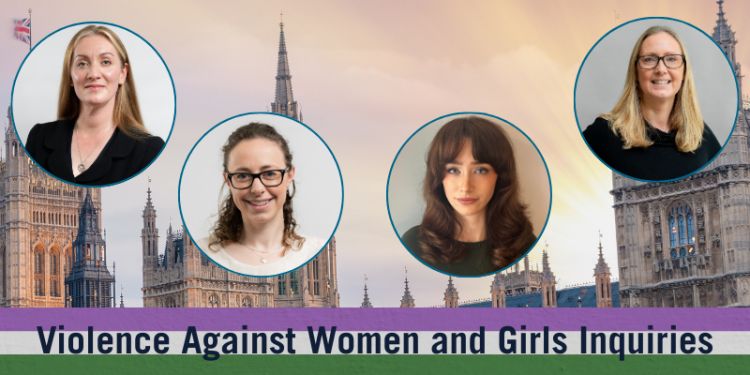Feminist Research Into Violence and Abuse network members support UK Government to tackle violence against women and girls

The Feminist Research Into Violence & Abuse (FRIVA) Network is an interdisciplinary group of scholars working to support women, girls and members of other marginalised groups.
Recently, FRIVA members Dr Anna Barker, Sophie de Groot, Dr Sam Lewis and Dr Rebecca Shaw submitted written evidence to UK Parliamentary Select Committee Inquiries on responding to violence against women and girls (VAWG). Their evidence drew on multiple research projects, conducted with academic colleagues and collaborative partners, including domestic abuse service providers and third sector organisations.
Parks and green spaces
Dr Barker et al.'s evidence to the Public Accounts Committee inquiry on VAWG focused on concerns about safety and the threat of VAWG in parks and green spaces. Many women and girls limit their use of parks, avoid them at certain times, or refrain from visiting alone. This negatively affects their social lives, health, wellbeing, and participation in outdoor activities. Their research demonstrated how design, data and community action can make parks safer for women and girls. The authors proposed a series of recommendations. These included prioritising Safer Parks in national VAWG strategies; providing long-term funding for park safety schemes; gender-sensitive planning and design; and expanding bystander intervention training.
Abuse of adolescent girls
Sophie de Groot's submission to the Public Accounts Committee was informed by research with designated safeguarding leads, pastoral support workers and independent domestic violence advisors (IDVAs) on adolescent relationship violence, undertaken as part of an MA in Social Research. She found that misogyny, both online and at school, are key drivers of abuse in adolescent relationships, where girls are predominantly the victims. Her research participants described the impact of online influencers who promote toxic masculinity, and the rise of violent pornography, on adolescent boys' expectations of intimate relationships. She called for national curriculum content on healthy relationships to be trauma-informed and intersectional, and to reflect the reality of young people’s relationships, recognising the growth of image-based sexual violence and digital coercive control.
Rural domestic abuse
Almost 11 million people live in rural England and Wales. Evidence suggests that domestic abuse rates are higher in rural than in urban areas. The particular needs of rural survivors, and practitioners, are rarely considered in policy debates, however. In evidence to the Home Affairs Committee inquiry on VAWG, Dr Sam Lewis, Cumbria Constabulary, the Office of Cumbria's Police, Fire and Crime Commissioner, and Cumbria Gateway called for Government-led discussions of VAWG to accommodate rural perspectives. Additionally, they called for flexibility in bidding criteria for national VAWG funding streams, to allow applications from rural forces. They also recommended the establishment of a national, minimum dataset and reporting standards for third sector domestic abuse service providers, alongside financial and practical support to develop robust data collection and management systems.
The harmful narratives surrounding domestic abuse
Dr Rebecca Shaw's evidence to the Public Accounts Committee inquiry concerned the persistence of harmful domestic abuse narratives, that drive a lack of understanding about domestic abuse. This, in turn, can negatively affect service provision and wider societal responses to the problem. Dr Shaw called for a greater focus on challenging harmful narratives around domestic abuse as part of efforts to prevent VAWG. She emphasised how crucial it is that children are educated about the nature of domestic abuse, to improve understanding and awareness. Drawing on ESRC-funded research with local practitioners, Dr Shaw urged the Government to embed her educational resource nationally into the Relationships, Sex and Health Education (RSE) curriculum to drive long-term changes in attitudes to domestic abuse.
Dr Lewis, who leads FRIVA, said:
Our network members are committed to improving the lives of women and girls, and marginalised groups, through our research and activism. Engagement with policymakers is key, and we stand ready to support local and national efforts to halve VAWG in a decade.
FRIVA is holding a launch event on 20 June, at Wellington House, Leeds, supported by West Yorkshire Combined Authority. Any practitioners, policymakers and activists wishing to attend can sign up here: FRIVA Launch.




